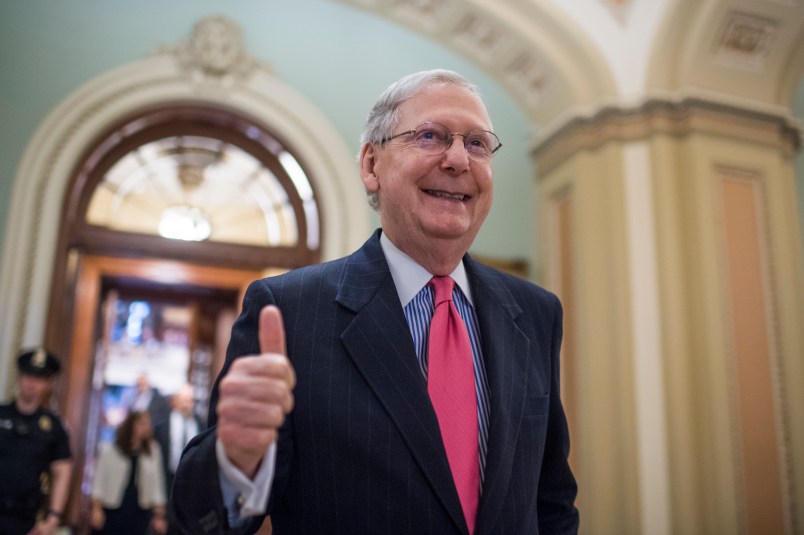Language tucked deep in the Medicaid provisions of the Senate GOP Obamacare repeal legislation appears to allow states to funnel leftover Medicaid money for use on roads, bridges, stadiums and other projects not directly related to Medicaid’s traditional definition.
A GOP aide is already walking back the language, telling the Washington Post on Monday that it was “an inadvertent error” and that the language would be fixed before a final bill is filed for a vote.
Yet health care experts say that language points to the larger problems posed if states take congressional Republicans up on their offer to convert Medicaid’s structure into a lump sum system under the Senate GOP bill.
“There’s all kinds of things that are wrong here, including this flexibility to use it for things that are not covered under Medicaid,” Judy Solomon, vice president for health policy at the left-leaning Center on Budget and Policy Priorities, told TPM.
The language appears on pages 93-95 of the Better Care Reconciliation Act, in a section giving states the option to take their Medicaid funding in what is known as a “block grant.” States also can choose a so-called “per capita cap” system, in which the feds set a limit on their Medicaid contribution on a per enrollee basis.
The block grant provision in the Senate bill says that as long as a state “satisfies the State maintenance” on its Medicaid program, it can use any leftover money from the block grants on “other State health programs (as defined or approved by the Secretary) or for any other purpose which is consistent with the quality standards established by the Secretary,” referring to the Health and Human Services secretary.
The key sentence in this section is one that says “Section 1903(i)(17) shall not apply to funds made available to a State.” That references a ban in existing Medicaid-related federal code that prohibits use of the funding “for roads, bridges, stadiums, or any other item or service not covered under a State plan under this title,” which Solomon notes was added after an uproar over allegations that states were gaming the Medicaid system for other purposes.
Such a system would incentivize states to cut their programs—in terms of limiting eligibility, reducing services or imposing cost-sharing—in order to recoup some of the block grant funding for other areas in their budget that may only be vaguely related to public health.
The text as written still gives the Health and Human Services secretary the opportunity “to put the brakes on,” said Sarah Rosenbaum, professor of health law and policy at the Milken Institute School of Public Health at the George Washington University. But states will also have a seat at the table for the rule-making process around these provisions if the Senate health bill becomes law, by overruling the Administrative Procedures Act to give states special status.
“For the states that want other health programs to be defined broadly, they can put a thumb on the scale before the rule is even proposed in the federal register,” Rosenbaum said.
As Majority Leader Mitch McConnell (R-KY) attempts another round of negotiations to win back enough votes to move the bill forward, it’s possible that a revised version of the legislation will be filed this week that also tweaks this language, as the anonymous aide told the Post.
McConnell’s spokesman did not respond to an inquiry regarding the language in the Medicaid provisions, nor did representatives from the Senate Finance Committee.







“Left over???” If you neglect and abandon your poor and elderly, you might get a bridge!
Don’t worry, even if they strike it here it will show back up later in the conference committee due to ‘an unknown aide’
How does somebody writing a specific exception to allow diverting the money to non-Medicaid purposes qualify as an “inadvertent error”? Seems like somebody intended to allow it.
An "inadvertent error” = “We were hoping you wouldn’t notice.”
Can you say “pork” and “sweetheart deals”?